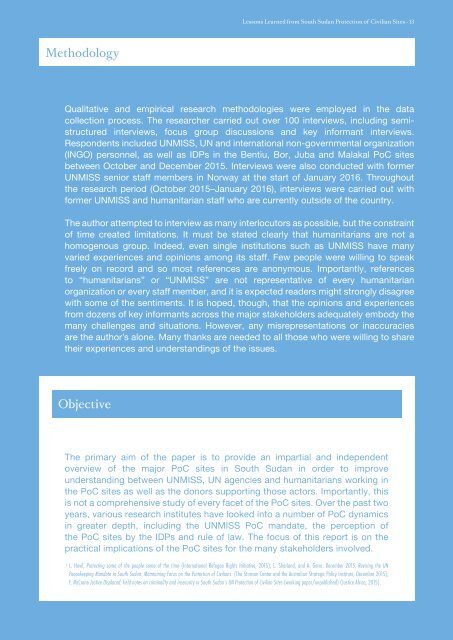Lessons Learned from South Sudan Protection of Civilian Sites 2013–2016
if_we_leave_0
if_we_leave_0
Create successful ePaper yourself
Turn your PDF publications into a flip-book with our unique Google optimized e-Paper software.
<strong>Lessons</strong> <strong>Learned</strong> <strong>from</strong> <strong>South</strong> <strong>Sudan</strong> <strong>Protection</strong> <strong>of</strong> <strong>Civilian</strong> <strong>Sites</strong> - 13<br />
Methodology<br />
Qualitative and empirical research methodologies were employed in the data<br />
collection process. The researcher carried out over 100 interviews, including semistructured<br />
interviews, focus group discussions and key informant interviews.<br />
Respondents included UNMISS, UN and international non-governmental organization<br />
(INGO) personnel, as well as IDPs in the Bentiu, Bor, Juba and Malakal PoC sites<br />
between October and December 2015. Interviews were also conducted with former<br />
UNMISS senior staff members in Norway at the start <strong>of</strong> January 2016. Throughout<br />
the research period (October 2015–January 2016), interviews were carried out with<br />
former UNMISS and humanitarian staff who are currently outside <strong>of</strong> the country.<br />
The author attempted to interview as many interlocutors as possible, but the constraint<br />
<strong>of</strong> time created limitations. It must be stated clearly that humanitarians are not a<br />
homogenous group. Indeed, even single institutions such as UNMISS have many<br />
varied experiences and opinions among its staff. Few people were willing to speak<br />
freely on record and so most references are anonymous. Importantly, references<br />
to “humanitarians” or “UNMISS” are not representative <strong>of</strong> every humanitarian<br />
organization or every staff member, and it is expected readers might strongly disagree<br />
with some <strong>of</strong> the sentiments. It is hoped, though, that the opinions and experiences<br />
<strong>from</strong> dozens <strong>of</strong> key informants across the major stakeholders adequately embody the<br />
many challenges and situations. However, any misrepresentations or inaccuracies<br />
are the author’s alone. Many thanks are needed to all those who were willing to share<br />
their experiences and understandings <strong>of</strong> the issues.<br />
Objective<br />
The primary aim <strong>of</strong> the paper is to provide an impartial and independent<br />
overview <strong>of</strong> the major PoC sites in <strong>South</strong> <strong>Sudan</strong> in order to improve<br />
understanding between UNMISS, UN agencies and humanitarians working in<br />
the PoC sites as well as the donors supporting those actors. Importantly, this<br />
is not a comprehensive study <strong>of</strong> every facet <strong>of</strong> the PoC sites. Over the past two<br />
years, various research institutes have looked into a number <strong>of</strong> PoC dynamics<br />
in greater depth, including the UNMISS PoC mandate, the perception <strong>of</strong><br />
the PoC sites by the IDPs and rule <strong>of</strong> law. The focus <strong>of</strong> this report is on the<br />
practical implications <strong>of</strong> the PoC sites for the many stakeholders involved.<br />
1 L. Hovil, Protecting some <strong>of</strong> the people some <strong>of</strong> the time (International Refugee Rights Initiative, 2015); L. Sharland, and A. Gorur. December 2015. Revising the UN<br />
Peacekeeping Mandate in <strong>South</strong> <strong>Sudan</strong>: Maintaining Focus on the <strong>Protection</strong> <strong>of</strong> <strong>Civilian</strong>s. (The Stimson Center and the Australian Strategic Policy Institute, December 2015);<br />
F. McCrone Justice Displaced: field notes on criminality and insecurity in <strong>South</strong> <strong>Sudan</strong>’s UN <strong>Protection</strong> <strong>of</strong> <strong>Civilian</strong> <strong>Sites</strong> (working paper/unpublished) (Justice Africa, 2015).


